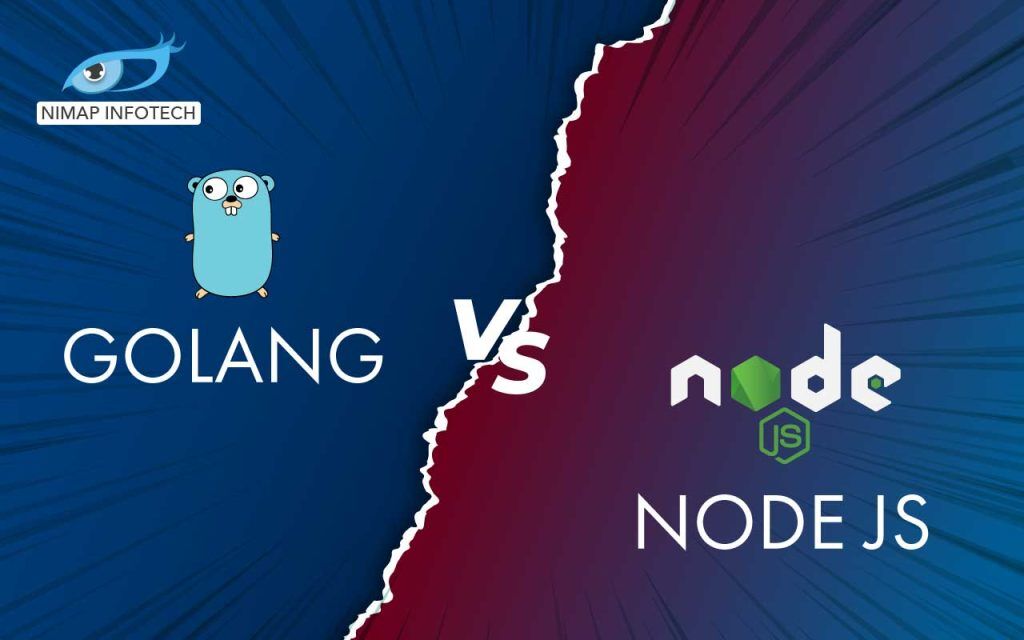Table of Contents
ToggleWhat is Nodejs?
Introduced way back in 2009 and built as well as developed on Google Chrome’s V8, Nodejs is specifically written using JavaScript. This is an open-source technology that runs on the server-side runtime environment. It is one of the most preferred choices by developers and programmers when it comes to cross-platform app development. Also, you can use it for say an event-driven, non-blocking I/O model design, it is most recommended by many programmers and developers to develop highly scalable server-side applications.
When it comes to why should companies use node js, the answer is- it becomes much simpler and easier for mobile app developers and programmers to write both server-side and client-side scripts all by using a single language. Furthermore, support from many different operating systems such as Linux, Unix, Windows, Mac is filled with open-source JS libraries that provide features and functionality meant for simplifying web application development using Nodejs.
By offering the best of the best, the preference of using this technology spiked up in the year 2017, and as per Google Trends, and is still high. The reason for this surge behind it is the availability of programming-friendly features, and core advantages to the developers and programmers.
Features of NodeJs:
1. Asynchronous Event handling:
All APIs of Node.js library are designed to be asynchronous, that is, non-blocking. It basically implies in simple words that it is a Node.js based server and never relies on API that will bring information back. The server moves to the following API in the wake of calling it and there exists a noticeable component of Events of Node.js encourages the server to get a reaction from the past API call.
2. Multi-threaded:
One of the key features and abilities that Node.js provides is the non-blocking technique which implies that all capacities (callbacks) are designated from the ground up to the occasion circle and they are (or can be)and can be easily executed by various strings. That is taken care of by the execution method provided by Node.js run-time. Node.js bolsters and powers the different forking procedures (which are executed on various centers). You should know that state or the values in memory isn’t shared among ace as well as forked procedure.
3. Object-oriented:
An immense grievance or issue against NodeJS was down to its JavaScript legacy, which oftentimes included loads of conceptual spaghetti based and typed code. Structures like CoffeeScript as well as TypeScript illuminated these issues, yet this came as a jolt for the individuals who truly thought neatly or organized coding guidelines.
4. Two-way Binding:
Sockets permit a server to communicate and send messages to all users associated with a particular thread that is under execution. NodeJS has a bit of leeway or an upper hand as a result of its event-driven non-blocking programming model that it implements, which makes it unmistakably fit to deal with bindings. NodeJS was the first technology to do it well and it is still able to show improvement over some other structure.
Do contact us if you are looking to Hire Nodejs Developer.
What is Golang?
Golang is Google’s product that was invented and created in the year 2007 is commonly known for being open-source, multi-purpose, statically-typed. The language is going to be a specific combination of C/C++ security and performance along with carrying the speed of execution like that of Python.
Golang performance is widely known for handling many multiple and concurrent programming models while being recommended for its intuitive and robust garbage collection handlings, dynamic interfaces, as well as memory safety. Also, the language is apt and perfect for different cloud-based interfaces, real-time application development, as well as various microservices, and networking applications.
Hence, get an in-depth understanding by reading this blog article for why use Go language for the next project. How it can become fruitful for you.
Features of Golang
1. Golang Is Fast
Google’s product is Golang, which is fast due to its compiled machine code. Also, programs created using Go are also compiled fast, thus results in a small binary.
2. Learning Capabilities
What catches Google’s Go vs Node attention is its intuitive and smooth learning capabilities. Due to Go’s small syntax for the code, it can be easily learned by many different web app developers. Also, the language is quite clean as well as easy to read
3. Standard Library
Golang performance can be proven through the implementation and use of sound library along with having built-in functions with primitive types. Furthermore, it involves packages that are compact and that made the language easy to handle I/O, web server along with easy and tactful manipulating raw bytes as well as cryptography.
4. Support For Testing
Another reason for using Google’s Golang is it’s because of the availability of a built-in standard library. Having a standard library on its side, Go is able to be blazingly fast in the execution of tests.
5. Static Analysis Tools
Google’s GO static analysis tools provide and have got numerous advantages. According to Go’s suggested style, its gofmt function formats code. Through the use of this process of suggested style, the backend web development team or individual developers can prioritize other work instead of following the code’s objective accomplishment.
6. Garbage Collection
In comparison to C and C++, Google’s Go memory management is being done very easily. Also, the garbage collected objects or memory are dynamically allocated while using the famous arithmetic pointers.
7. Concurrency Model
Believe it or not, the concurrent programming model that is currently being used in the programming world is a little difficult. But with the help of Go, it makes it easy to use and do the jobs better. Thus, resulting in the creation of many different complex patterns.
Do contact us if you are looking to Hire Golang Developer.
Also Read: NodeJS vs Django: Javascript or Python which is best?
NodeJS VS Golang Comparison
Factor 1- Performance
When it is the question arises that the best performance between Go vs Node. Google’s Go somehow wins the show by rendering code easily as compared to NodeJs which is based on Javascript. Also, Nodejs when you compare it in terms of raw performance and computation, Go is the winner here.
Factor 2- Maturity
Google’s Go being introduced in 2007. Or compared to Nodejs came in the year 2009 share an equal level of maturity and robustness. Meanwhile, Node.js still has the support of the wider audience and community on its side.
But the performance as well as the intended maturity level in comparison. Both Go as well as Node.js performance are similar.
Factor 3– Real-Life Performance
When it comes to real-life performance. Both Nodejs as well as Google’s Go are capable enough of offering the same level of results at equal speed and performance.
Factor 4- Handling Errors
Another point or objective that validates which language is best for any kind of backend development is its error handling mechanism. Node.js performance is still all about using the age-old traditional throw-catch error handling mechanism. Thus this makes it one of the most preferred languages among programmers.
Meanwhile, the error handling issue in Google’s Go cannot work without explicit error checking.
Coming to the error handling factor that it provides, Node.js performance is better as compared to Google’s Go.
Factor 5– Learning Curve
When talking about the learning curve for budding developers, Nodejs is scoring high as compared to Google’s Go. Also, JavaScript being in the app development industry for quite a while now. From the last many years offers to offer both online and offline resources. This is to help newbies and beginners in the line.
On the other hand, Go is a new lad in direct comparison to Nodejs. It provides specific concepts, rules, processes, interfaces, as well as pointers. Apart from that, it has fewer resources that are readily available online and offline. Thus, it becomes a little difficult or complex for developers and programmers to get handy information.
Factor 6– Concurrency
The comparison between Nodejs vs Golang makes the latter one win very easily when it comes to concurrency. Concurrency is on the side of Go as it implements in code robustly. Thus this makes it a suitable option for big or large scale software projects. Using a lightweight thread communication mechanism that is handy, Go makes developers and programmers run functions concurrently.
Meanwhile, Nodejs, in comparison, makes the use of single-thread as well as event-callback mechanism. The practice makes it mandatory to opt and use the linear order. This works as a hindrance or obstruction for concurrency.
Factor 7- Scalability
Next in the line is the factor of scalability which makes Go win without any competition from Nodejs. Go gets its edge due to Goroutines as its major asset. And this makes it easy and helps in handling parallel threads efficiently. However, this has not been the case with Nodejs. Nodejs is a little scalable in comparison and this makes it inappropriate and flunked it from large projects.
Between Go vs Node, here the apt winner is Google Go.
Factor 8- Tools For Development
Because Go is a new and a younger language in comparison with Nodejs. It lacks when it comes to tools and components that are available readily with the latter one. Google’s Go does come up with a different set of libraries and packages. But still, it does not and is unable to beat Nodejs.
Also, Go asks for first-hand experience in the manual configuration for ongoing and developing different projects. On the other hand, we have Nodejs flaunting its use of an array of tools. The frameworks, as well as libraries for app variants, are good. Also, the latter one does have a huge and ever-increasing community. All of this is provided for the extended support meant for development and coding tasks.
Hence, here the winner is going to be Nodejs.
Factor 9– Availability Of Developers
Nodejs being in the backend kind of work for the web development industry.
Though Go is newer and more younger in the market with fewer developers. It has a bright future.
So, when it comes to comparison between Nodejs and Google’s Go, Nodejs is going to be again a winner.
Both platforms have their own growing user base as well as different benefits. Many developers prefer JS as it is the most popular programming language and is ruling the web development world.
Comparison Between Golang and NodeJS:
| GOLANG | NODEJS |
| Its simple to read and maintain code. | MongoDB, a NoSQL database, is highly integrated. |
| Static typing prevents variable errors. | With the built-in Event loop capability, it provides rapid performance. |
| Static code analysis tools, such as GoMetaLinter, are available. | This is useful for creating scalable web apps. |
| improved compiled language performance | Suitable for developing streaming applications |
| Alerts developers when code lacks documentation | It enables easy caching of individual modules and facilitates rapid application development. |
| APIs for testing and stretching code are available. | With frequent upgrades and releases, the community is active and growing. |
Advantages of Golang
-
The credentials:
Google funds Golang. Its inventors, Robert Griesemer, Rob Pike, and Ken Thompson, are already well-known for their contributions to Unix, JVM, C, B, and other fields. Surprisingly, it is believed that the language was created to address past problems and to anticipate future challenges.
-
Concurrency:
Concurrency is infamous for being tough, however using this open source programming language, concurrency is tractable and extremely simple. The developer may complete requests more quickly, freeing up hardware and network resources much sooner.
-
Easy to learn:
If your development team is wanting to transition from their current language to a new one, Go is a fantastic option because the syntax is nearly identical to other learning languages. The documentation is also simple to understand. If you use the standard library, the team can learn it in a couple of weeks, if not hours. Writing a simple command-line application and an HTTP server is a piece of cake.
-
Open source by nature:
If there are any problems, gophers, as Golang developers are known, will detect and correct them so that they can be readily solved before they become a problem.
-
Fast language:
The straightforward structure and syntax are unquestionably advantageous, and developers find it easy to understand. Furthermore, it lacks type inheritance and classes. This makes it easier to get a product to market fast and, even better, to keep it there.
Advantages of NodeJS
-
High performance for real time applications:
The most significant advantage of Node Js is its great performance for real-time applications. It’s also one of the advantages of utilising NodeJS for supercharged applications. Node.js application frameworks can easily do numerous jobs. Despite the complexity and cost of incorporating a single CPU, the IPsec design is highly scalable, allowing IPSec to perform concurrent queries without clogging RAM.
-
Web App Development:
The benefits of using Node.js on web apps differ greatly depending on the firm and its IT strategy. Examples include technical scalability, speed and performance, and application constraints. Decisions made at this stage impact how quickly you enter the market. As a prominent client-facing programming language, Java dominated online sites. Until the debut of Node.js, JavaScript was simply a notion. If JavaScript is installed, development with node.json is incredibly simple, cost-efficient, and extremely effective.
-
Easy to learn and quick to adapt:
JavaScript is not extensively used as a programming language. With little programming skills, NodeJS may be constructed quickly and effortlessly. Writing code involves less effort. In 2016, NodeJs users polled a lot of developers to master the JavaScript programming language. It appears to be a general-purpose programming language. Even if the developer is a beginner or a junior developer, there is no need to spend more time learning NodeJS.
-
Help to build cross-platform applications:
Node.js enables development across Electron and NW.Js platforms for generating interactive web applications on any platform. As a result, there isn’t much time spent developing separate apps for different desktop versions. You may design desktop apps without any prior knowledge of Objective-C or C#. Your Node.js developer can also freely use Chrome developer tools for creating, debugging, and writing code.
-
Reusable code:
Code reusability is critical in software development and provides numerous advantages. Because reusing code is safe, secure, and dependable, it raises the application’s value. Furthermore, because the code is more modest, it is less likely to have flaws. Because fewer lines of code are used, a programme is more likely to be sensible and easy. Furthermore, because the code is more modest, there is less chance of problems. Because fewer lines of code are used, a programme is more likely to be sensible and easy.
Read More: Django vs Laravel vs NodeJS: Comparison
Conclusion- NodeJs vs Golang:
With all the factors analyzed, we can conclude that it indeed depends on what you are trying to achieve. What features do you want your application to have. It all boils down to your personal preferences. Both languages good enough to use for building applications. Hope you like this blog on Golang vs NodeJs If you wish to hire nodejs developer then do contact us with your requirements at enquiry@nimapinfotech.com.
Author
-

Sagar Nagda is the Founder and Owner of Nimap Infotech, a leading IT outsourcing and project management company specializing in web and mobile app development. With an MBA from Bocconi University, Italy, and a Digital Marketing specialization from UCLA, Sagar blends business acumen with digital expertise. He has organically scaled Nimap Infotech, serving 500+ clients with over 1200 projects delivered.
View all posts







